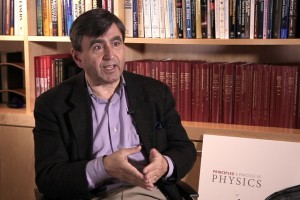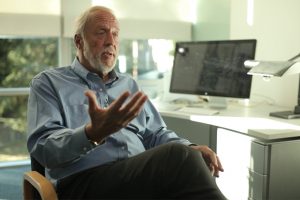Ethics for an Age of Commerce
Economist Deirdre McCloskey on fundamental human virtues, their secular interpretation and necessary applicati...
I would say that by the 13th century, universities were centres of learning which have learning itself as their major goal. They’re not necessarily centres for producing politicians, they’re not necessarily propping up the state in any way. They were places where scholars went to intensify and focus their studies. We got the development of something we call scholasticism, which is a certain kind of method which does develop out of Aristotle and other places. It’s a kind of rigour that scholars apply to studying texts.
So, in the 12th century, we have Peter Abelard, he’s one of the great but also one of the most controversial figures in the history of, I think, Western thought. Abelard was extremely proud of himself, he was extremely arrogant in many ways. he admits it himself, and he writes an autobiography. He was a great master, he was an expert in theology, he was an expert, most of all, in logic and in debating. He was an expert at Aristotle, he had a great facility for picking apart people’s arguments, and he had rivals within the city of Paris. His first great break came when he humiliated his teacher: he turned up and humiliated him, pointed out that his argument was nonsensical in front of all the students, and nobody came back to that master afterwards.
Abelard gained a great reputation, but Abelard’s star burnt a little bit too brightly. He seduced one of his students, who incidentally was more intellectually brilliant than him, a woman named Eloise who knew Hebrew and Greek when nobody in Europe knew Hebrew and Greek. She was a truly phenomenal intellectual. But he seduced her; her uncle found out and decided to punish Abelard – crept into his room late at night and castrated him. This was a huge lesson for Abelard. Was it his seduction that got him in trouble? Well, his reputation didn’t help, his reputation for upsetting other scholars didn’t help. That early university environment was one of rivalries and competition.
He was not afraid to ask even the most bold questions: does God exist? Is the world eternal? Abelard was mostly orthodox; he didn’t say anything outrageous, but he got into trouble, and his work on the Trinity, for example, was burnt, the work had to be burnt. He said it hurt him more than the castration when he watched it: I don’t believe it, but when he watched that work being burned, it was his life’s work.
So, the controversy is always there. What can you say or what can’t you say as a scholar? For Abelard, his problem was he’d use logic to try and analyze the Trinity, the Father, the Son and the Holy Spirit, the great Trinity at the heart of Christian theology. What is this Trinity? It’s three persons; it’s also one person. Does this mean there are three gods? No, it means there’s one god, but it’s a mystery, it means it’s beyond our understanding. So when Abelard said we could actually use metaphor and logic to understand what this means, I think he actually did a great job, but at the time, it was controversial, and Abelard’s book had to be burnt because it was exactly the kind of overstepping the boundaries in scholarship that the universities or at least the early schools, some people thought they shouldn’t be doing.
By the 13th century, the focus of a lot of these debates became Thomas Aquinas. Now, Aquinas is a great saint in the catholic church. Aquinas, I think, most scholars of medieval philosophy would say, is a great figure, a towering intellectual who produced millions of words in his life. His scholarship is immense: the Summa Theologica and other works. But Thomas was also a logician, Thomas also used logic and the works of Aristotle and also the works of Islamic commentators on Aristotle to try and analyze the great mysteries of the faith.
For Aquinas you could use logic, but also your senses themselves, your empirical observations of the world you could use to understand God.
So Aquinas, for example, proved the existence of God just by using his five senses. It’s a wonderful piece of writing. It’s actually difficult to refute today; you might have a difference of opinion about what ‘god’ means, maybe ‘god’ means the Big Bang, maybe it means something else, maybe it means truth, but still, Aquinas’s proof is impressive.
For some, again, towards the end of the 13th century, this is a problem, this is stepping too far: not necessarily the proof of God itself but other issues that Aquinas approached in his work. For Aquinas, the fact that we should be able to use reason to understand all things in the world opens up all sorts of problems. What about miracles? Miracles are beyond reason, they’re in the world. Does this mean that for Aquinas, miracles don’t exist? And all kinds of other issues along these lines. Aquinas’s work was condemned in 1277 precisely for the reason that it went too far. For example, there’s a list of accusations made about Aquinas, like that he denies that God created the universe, he says the world is eternal and things like that.
So these are the kinds of problems that arise. Aquinas is later reprieved and becomes actually The Authority if you’re going to study theology in the 15th and 16th centuries, Aquinas is the authority, but for a while, that is really controversial.
With all these controversies by the end of the latter part of the Middle Ages, there’s a big question: what is the university for, and who does it serve? Should university professors be supervised by a kind of committee of high theologians who restrict what you can and cannot say what you can and cannot study? Or should it be free? Should scholars just research and probe the mysteries of the universe and come up with their own conclusions? Should they be orthodox, or should they be free?
So there’s a crisis in the university: who does it serve? Is it a tool of the state, a tool of the church, if you like? Or is it some kind of academic free space in between? In many ways, this controversy doesn’t really get resolved, in many ways, the question of what a university is for has never really been resolved in these terms. There are those of us who still think that universities are these kinds of islands of academic freedom where inquiry takes place on its own terms for its own purpose, and still, there are other ways of thinking that university ultimately props up industry or that it can be a political tool, that it builds a society around a certain political agenda.
I think one mistake people often make about medieval universities when they think about them, is that they think that they were actually always these free spaces of inquiry, that actually they were peaceful environments in which students learned for the sake of learning.
But actually, what you find when you dig into the history of the medieval university is there’s an enormous amount of conflict, and controversy. As I say, there’s great violence, people are burnt at the stake as a result of things that they said in a university or in a context or as a result of university masters ruling against them. These are controversial spaces, and they produce very different routes, if you like, for modern institutions. If a modern institution wants to trace its roots to a medieval university, then it needs to be careful what kind of medieval university it’s thinking about. Is it thinking about the Parisian theology faculty that propped up Philip the Fair? Is it thinking about the Bologna law faculty, which was guided by student power? Or is it thinking about the secular university of Frederick II in Naples? Which medieval university do we tie ourselves to today?

Economist Deirdre McCloskey on fundamental human virtues, their secular interpretation and necessary applicati...

Physicist Eric Mazur on beginners' difficulties, teaching each other and making sense of information

Behavioral geneticist Robert Plomin on the prediction of GCSE results, reading disability, and the heritabilit...